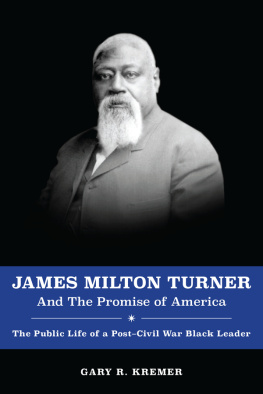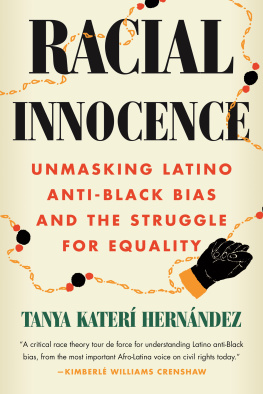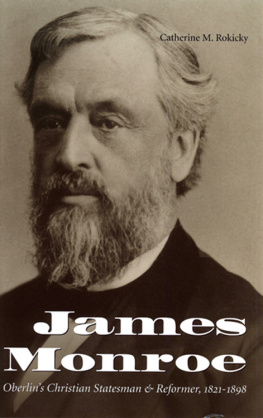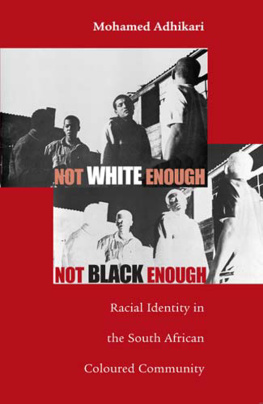Published by Louisiana State University Press
Copyright 2018 by Louisiana State University Press
All rights reserved
Manufactured in the United States of America
First printing
Designer: Barbara Neely Bourgoyne
Typeface: MillerText
Printer and binder: Sheridan Books
Library of Congress Cataloging - in - Publication Data
Names: Kornblith, Gary J. (Gary John), 1950 author. | Lasser, Carol, author.
Title: Elusive utopia : the struggle for racial equality in Oberlin, Ohio / Gary J. Kornblith
and Carol Lasser.
Other titles: Struggle for racial equality in Oberlin, Ohio
Description: Baton Rouge : Louisiana State University Press, [2018] | Series: Antislavery,
abolition, and the Atlantic world | Includes bibliographical references and index.
Identifiers: LCCN 2018012614| ISBN 978-0-8071-6956-8 (cloth : alk. paper) | ISBN 978-0-8071-7015-1 (pdf) | ISBN 978-0-8071-7016-8 (epub)
Subjects: LCSH: Oberlin (Ohio)Race relations. | Oberlin (Ohio)History19th century. | Antislavery movementsOhioOberlinHistory19th century. | Abolitionists OhioOberlinHistory19th century.
Classification: LCC F499.O2 K67 2018 | DDC 305.8009771/23dc23
LC record available at https://lccn.loc.gov/2018012614
The paper in this book meets the guidelines for permanence and durability of the Committee
on Production Guidelines for Book Longevity of the Council on Library Resources.

ACKNOWLEDGMENTS
When we first envisioned this study two decades ago, we had no idea it would
take us so long to complete. But Oberlin is a community with a complicated history. As we struggled to make sense of how and why the town evolved from a utopian experiment in racial integration to a more typical American community riven by racial bigotry and a color line, we benefitted immeasurably from the help, advice, and knowledge of dozens of Oberlinians and scholars far and wide. We sincerely thank everyone who assisted us in this endeavor. This book belongs to you as well as us, though of course we assume full responsibility for errors that have made their way into the finished text.
Three gifted, generous individuals inspired us from the beginning of the project and repeatedly aided our efforts along the way. Marly Merrill warmly welcomed Carol to the study of Oberlin women when she arrived at the college in the early 1980s. Together they edited the correspondence of Lucy Stone and Antoinette Brown Blackwell, and they formed a close friendship that flourishes to this day. For this book, we have drawn extensively on Marlys vast knowledge of nineteenth-century Oberlin and we turned to her for smart and insightful comments on various drafts. She has provided us with sustained and sustaining encouragement throughout the writing process.
Phyllis Yarber Hogan is a grassroots historian of the highest order. Phyllis grew up in Oberlin, and her knowledge of the African American experience within the community is unsurpassed. She was the prime mover behind the formation of the Oberlin African-American Genealogical and History Group and also a key figure in the establishment of Juneteenth festivities in Oberlin, a community-based initiative designed to honor and celebrate Oberlins black heritage and achievements. Above all, Phyllis is a wise and candid truth-teller. Over many years, she has sought to educate us about how Oberlin looks to people raised here without wealth or white privilege. She keeps us honest, and we regard her as our toughest critic. She has read and critiqued much of the manuscript, and it is definitely better as a result. Phyllis is our activist hero.
The late Patricia Holsworth was an indefatigable researcher and genealogist
extraordinaire. With awesome dedication and diligence, she singlehandedly compiled a detailed genealogical database that encompassed over seventy thousand Oberlin residents, from the earliest settlers forward. It is a goldmine for historians as well as genealogists, and Pat was remarkably generous in making a computerized copy of the database available for our use without restriction. As an expert in reading nineteenth-century handwriting, she was able to decipher words and names that left us mystified, and she made linkages between multiple sets of records that required levels of patience and persistence much greater than ours. Plus she possessed a wonderfully dry sense of humor. We miss her deeply and wish she had lived to see this book in completed form.
Over the years, we hired a small army of students to help us with archival research, the digitization of census and tax records, the retrieval of materials from electronic databases, and a failed attempt to create a dynamic historical map using GIS software. Among those who performed these often unexciting yet utterly essential tasks were Tom Anderson-Monterosso, Jeffery Cristiani, Trish DeCoster, Nick Gliserman, Jen Graham, Max Kotelchuck, Nayeem Mahbab, Ben Master, Braden Paynter, Steve Prince, Cory Rogers, Natalia Shevin, and the amazing Ben Weber. We thank them for their contributions to this project, and we thank Oberlin College for financial grants that helped underwrite the cost of their fine work.
We also thank all the students in Carols Oberlin History as American History course, whose projects over the years helped us make sense of the puzzle that is Oberlin history. We thank, too, Kurt Russell and his Oberlin High School students who partnered with Carols students, and Principal William Baylis for his essential support.
In pursuing our research, we benefitted immensely from the expert guidance and supportive assistance of Oberlin Colleges talented librarians, archivists, and technologists. Reference librarians Megan Mitchell and Jen Starkey never seemed to tire of our asking them for help in tracking down obscure resources. Our frustrations became their challenges, which they met with cheerful enthusiasm. During the past decade, Associate Director of Libraries Alan Boyd promoted the digitization of local newspapers, an initiative that saved our tired eyes from yet more time at the microfilm reader. So did the work of volunteer Elizabeth Rumics, who labored assiduously on an index to those newspapers in the years before the digitization project began. Head of Special Collections Ed Vermue and his assistants, Lindsey Felice and William Tully, were always happy to pull from the shelves nineteenth-century
volumes that rarely made their way to the reading room. Heath Patten performed digital magic on problematic images. It would be impossible to overpraise the staff and the holdings of the Oberlin College Libraries.
The Oberlin College Archives are also superb. Much credit belongs to Roland Baumann, who served as the college archivist from 1987 to 2008. Roland is a historian of Oberlin in his own right, and he has kindly shared with us his extensive knowledge of relevant source materials and his views on our overlapping scholarly interests. We also thank Tammy Martin, who for many years helped Roland in supporting researchers. Since becoming the college archivist in 2008, Ken Grossi has warmly welcomed us and has reached out to townspeople as well as students to make the archives rich holdings increasingly accessible to all. We are deeply grateful to Ken, Associate Archivist Anne Salsich, and Archival Assistant Louisa Hoffman for their enthusiasm and their prompt responses to our sometimes obscure requests.









